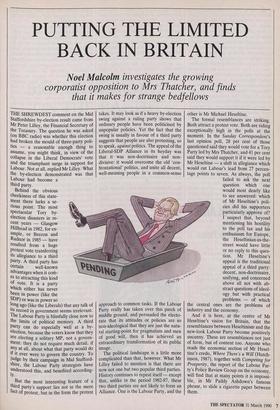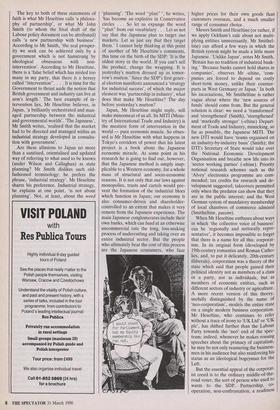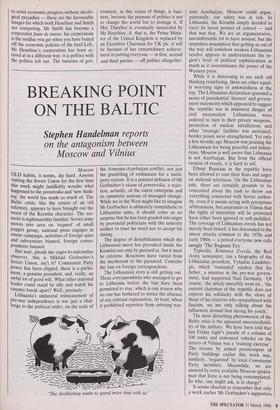PUTTING THE LIMITED BACK IN BRITAIN
Noel Malcolm investigates the growing
corporatist opposition to Mrs Thatcher, and finds that it makes for strange bedfellows
THE SHREWDEST comment on the Mid Staffordshire by-election result came from Mr Peter Lilley, the Financial Secretary of the Treasury. The question he was asked (on BBC radio) was whether this election had broken the mould of three-party poli- tics — a reasonable enough thing to assume, you might think, in view of the collapse in the Liberal Democrats' vote and the triumphant surge in support for Labour. Not at all, replied Mr Lilley. What the by-election demonstrated was that Labour had become a third party.
Behind the obvious cheekiness of this state- ment there lurks a se- rious point. The most spectacular Tory by- election disasters in re- cent years — Glasgow Hillhead in 1982, for ex- ample, or Brecon and Radnor in 1985 — have resulted from a huge protest vote transferring its allegiance to a third party. A third party has certain well-known advantages when it com- es to attracting this kind of vote. It is a party which either has never been in power (like the SDP) or was in power so 1011g ago (like the Liberals) that any talk of its record in government seems irrelevant. The Labour Party is blissfully close now to the limits of political memory. A third Party can do especially well at a by- election, because the voters know that they are electing a solitary MP, not a govern- ment: they do not require much detail, if any at all, about what that party would do if it ever were to govern the country. To judge by their campaign in Mid Stafford- shire, the Labour Party strategists have understood this, and benefited according- ly.
But the most interesting feature of a third party's support lies not in the mere fact of protest, but in the form the protest takes. It may look as if a heavy by-election swing against a ruling party shows that ordinary people have been politicised by unpopular policies. Yet the fact that the swing is usually in favour of a third party suggests that people are also protesting, so to speak, against politics. The appeal of the Liberal-SDP Alliance in its heyday was that it was non-doctrinaire and non- divisive: it would overcome the old 'con- frontational' politics, and unite all decent, well-meaning people in a common-sense approach to common tasks. If the Labour Party really has taken over this patch of middle ground, and persuaded the electo- rate that its attitudes or policies are so non-ideological that they are just the natu- ral starting-point for pragmatists and men of good will, then it has achieved an extraordinary transformation of its public image. The political landscape is a little more complicated than that, however. What Mr Lilley failed to mention is that there are now not one but two popular third parties. History continues to repeat itself — except that, unlike in the period 1982-87, these two third parties are not likely to form an Alliance. One is the Labour Party, and the other is Mr Michael Heseltine.
The formal resemblances are striking.
Both attract a protest vote. Both are riding exceptionally high in the polls at the moment. In the Sunday Correspondent's last opinion poll, 28 per cent of those questioned said they would vote for a Tory Party led by Mrs Thatcher, and 41 per cent said they would support it if it were led by Mr Heseltine — a shift in allegiance which would cut Labour's lead from 27 percen- tage points to seven. As always, the poll failed to ask the next question which one would most dearly like to see answered: which of Mr Heseltine's poli- cies did his supporters particularly approve of?
I suspect that, beyond mentioning his hostility to the poll tax and his enthusiasm for Europe, the Heseltinian-in-the- street would have little or no reply to this ques- tion. Mr Heseltine's appeal is the traditional appeal of a third party: decent, non-doctrinaire, unifying, and concerned above all not with ab- stract questions of ideol- ogy but with practical problems — of which the central ones are the problems of industry and the economy.
And it is here, at the centre of Mr Heseltine's vision for Britain, that the resemblances between Heseltinism and the new-look Labour Party become positively uncanny. These are resemblances not just of form, but of content too. Anyone who reads the economic section of Mr Hesel- tine's credo, Where There's a Will (Hutch- inson, 1987), together with Competing for Prosperity, the report of the Labour Par- ty's Policy Review Group on the economy, will find that at many points it is impossi- ble, in Mr Paddy Ashdown's famous phrase, to slide a cigarette paper between them. The key to both of these statements of faith is what Mr Heseltine calls 'a philoso- phy of partnership', or what Mr John Smith (to whom the final draft of the Labour policy document can be attributed) calls 'a new partnership with business'. According to Mr Smith, 'the real prosper- ity we seek can be achieved only by a government which is not hamstrung by ideological obsessions with non- intervention'. According to Mr Heseltine, there is a 'false belief which has misled too many in my party, that there is a heresy called "intervention". . . . It is time for the Government to thrust aside the notion that British government and industry can live at arm's length.' The best example of in- tervention lies, Mr Heseltine believes, in Japan, 'a brilliantly orchestrated and man- aged partnership between the industrial and governmental worlds'. 'The Japanese', Mr Smith writes, 'realised that the market had to be directed and managed within an industrial strategy developed in consulta- tion with government'.
Are these allusions to Japan no more than a sanitised, orientalised and updated way of referring to what used to be known (under Wilson and Callaghan) as state planning? Mr Smith dislikes such old- fashioned terminology: he prefers the phrase, 'industrial strategy'. Mr Heseltine shares his preference. Industrial strategy, he explains at one point, 'is not about planning'. Not, at least, about the word `planning'. 'The word "plan" he writes, `has become an expletive in Conservative circles . . . So let us expunge the word "plan" from our vocabulary . . . Let us not say that the Japanese plan to target our markets. Let us just say that they target them.' I cannot help thinking at this point of another of Mr Heseltine's comments, this time on the birth of the SDP: 'It is the oldest story in the world. If you can't sell the product, change the wrapping. It is yesterday's mutton dressed up as tomor- row's mutton.' Since the SDP's first gener- al election manifesto announced a 'strategy for industrial success', of which the major element was 'partnership in industry', what does that make Mr Heseltine? The day before yesterday's mutton?
Japan, Mr Heseltine might reply, will make mincemeat of us all. Its MITI (Minis- try of International Trade and Industry) is the meatiest form of intervention in the world — pure economic muscle. So obses- sed is Mr Heseltine with what happens in Tokyo's corridors of power that his latest project is a book about the Japanese economic miracle. At some point in his research he is going to find out, however, that the Japanese method is simply inap- plicable to a Western economy, for a whole mass of structural and socio-economic reasons. It is not only that our laws against monopolies, trusts and cartels would pre- vent the formation of the industrial blocs which function in Japan; our economy is also consumer-driven and shareholder- controlled to an extent that makes it very remote from the Japanese experience. The main Japanese conglomerates include their own banks, which can fund at an otherwise uncommercial rate the long, loss-making process of undercutting and taking over an entire industrial sector. But the people who ultimately bear the cost of this process are the Japanese consumers, who face higher prices for their own goods than customers overseas, and a much smaller range of consumer choice.
Messrs Smith and Heseltine (or rather, if we apply Ockham's rule about not multi- plying entities unnecessarily, Mr Smithel- tine) can afford a few ways in which the British system might be made a little more Japanese. 'Unlike Japan', notes Mr Smith, `Britain has no tradition of industrial bank- ing.' Because banks cannot hold shares in companies', observes Mr -eltine, 'com- panies are forced to depend on costly short-term money, unlike their counter- parts in West Germany or Japan.' In both his incarnations, Mr Smitheltine is rather vague about where the 'new sources of funds' should come from. But the general solution is clear: we need a 'transformed' and 'strengthened' (Smith), 'strengthened' and 'markedly stronger' (-eltine) Depart- ment of Trade and Industry, mimicking, so far as possible, the Japanese MITI. The new DTI would have 'teams organised on an industry-by-industry basis' (Smith); the DTI's Secretary of State would take over the National Economic Development Organisation and breathe new life into its 'sector working parties' (-eltine). Priority national research schemes such as the 'Alvey' electronics programme are com- mended; tax credits for research and de- velopment suggested; takeovers permitted only when the predator can show that they are in the public interest; and the West German system of mandatory membership of local chambers of commerce admired (Smitheltine, passim).
When Mr Heseltine enthuses about ways in which 'the collective voice of business' can be 'regionally and sectorally repre- sentative', it becomes impossible to forget that there is a name for all this: corporat- ism. In its original form (developed by 19th-century romantics and Roman Catho- lics, and, to put it delicately, 20th-centurY illiberals), corporatism was a theory of the state which said that people gained their political identity not as members of a class or a party, nor as individuals, but as members of economic entities, such as different sectors of industry or agriculture. A more recent version of this theory, usefully distinguished by the name of `neo-corporatism', models the entire state on a single modern business corporation. Mr Heseltine, who continues to refer without a trace of irony to `UK Ltd' or 'UK plc', has shifted further than the Labour Party towards the 'neo' end of the spec- trum; indeed, whenever he makes rousing speeches about the primacy of capitalism, he may be not only reassuring the business- men in his audience but also reinforcing his status as an ideological bogeyman for the Left.
But the essential appeal of the corporat- ist creed is to the ordinary middle-of-the- road voter, the sort of person who used to warm to the SDP. Partnership, co- operation, non-confrontation, a readiness to assist economic progress without ideolo- gical prejudice — these are the favourable images for which both Heseltine and Smith are competing. Mr Smith has become a corporatist faute de mieux: his corporatism is the residue you get when you have boiled off the economic policies of the hard Left. Mr Heseltine's corporatism has been ar- rived at in a different way: it is politics with the politics left out. The business of gov- ernment, in this vision of things, is busi- ness, because the purpose of politics is not to change the world but to manage it. If Mrs Thatcher is eventually succeeded by Mr Heseltine, if, that is, the Prime Minis- ter of the United Kingdom is replaced by an Executive Chairman for UK plc, it will be because of her extraordinary achieve- ment in putting everyone — in first, second and third parties — off politics altogether.




























































 Previous page
Previous page